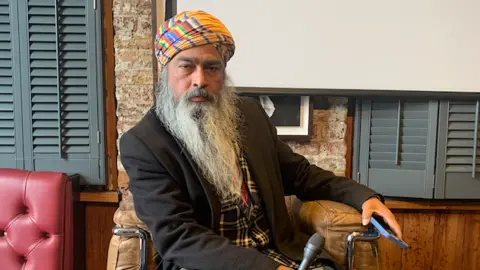Hunt for Bitcoin Founder Satoshi Nakamoto Hits Another Dead-End
In a fresh chapter of the ongoing search for Bitcoin’s mysterious creator, Satoshi Nakamoto, recent claims have once again led to disappointment. A press conference held in London drew attention from both the crypto community and the media, yet it provided no breakthrough in identifying the founder of Bitcoin, a digital currency that has become the linchpin of the $2 trillion cryptocurrency industry.  Who is Stephen Mollah? The Man Who Claims to Be Real Satoshi Nakamoto
Who is Stephen Mollah? The Man Who Claims to Be Real Satoshi Nakamoto
This latest effort followed an HBO documentary that had hinted at Canadian Bitcoin developer Peter Todd as Nakamoto, a claim Todd himself quickly denied.
The press conference, organized by Charles Anderson, featured a man named Stephen Mollah, who claimed to be Nakamoto but ultimately provided no substantial evidence to support his statement. Although Mollah promised to authenticate his identity by interacting with the first-ever Bitcoin mined by Nakamoto, he failed to do so, leaving attendees unconvinced. Despite the substantial intrigue, this attempt, like many before it, yielded no concrete proof about Nakamoto's true identity.
The Allure of Nakamoto’s Identity
The obsession with uncovering Nakamoto’s identity is driven not only by historical curiosity but also by the enormous influence the individual, or group, would wield in the world of cryptocurrency. Since Nakamoto holds over one million Bitcoins, worth billions of dollars, the creator’s opinions could carry enormous weight and possibly impact the global economy. However, Nakamoto’s anonymity is widely regarded as crucial to Bitcoin’s design as a decentralized, trust-based currency.
This sentiment resonates with members of the Bitcoin community. Adam Back, an early Bitcoin developer, has pointed out that the mystery behind Nakamoto’s identity is beneficial, allowing Bitcoin to operate independently of a central figure. Back suggested that "no one knows who Satoshi is, and that's a good thing"—a sentiment echoed by Natalie Brunell, a Bitcoin podcaster who has argued that the mystery is essential for the protocol's autonomy. The lack of a visible leader, she argues, helps users trust the system rather than an individual.
Previous Attempts to Uncover Satoshi Nakamoto
Over the years, many have been accused of being Nakamoto, with each claim either debunked or denied. Among the most famous examples was Dorian Nakamoto, a California-based man who was identified as the founder in 2014. The story gained considerable media attention until Dorian denied any involvement, resulting in widespread skepticism about the theory.
The most persistent and controversial claimant remains Craig Wright, an Australian scientist who first denied but later claimed to be Nakamoto. Despite his insistence, Wright has failed to provide any definitive evidence, and in a recent UK court ruling, he was once again denied recognition as Bitcoin’s founder. Elon Musk, too, was once rumored to be Nakamoto due to his technological expertise, though he denied any involvement, calling the theory baseless
The Purpose of Remaining Anonymous
The question of why Nakamoto might want to remain anonymous has long been debated. Some suggest that avoiding public scrutiny and potential security threats are primary motivations, especially given the high stakes involved. As Bitcoin’s value surged, Nakamoto’s fortune grew exponentially, making them one of the wealthiest individuals in the world—albeit a silent one. Bitcoin developer Peter Todd, another name in the Nakamoto speculation pool, has expressed that Nakamoto's anonymity is likely intentional, both to avoid safety risks and to maintain Bitcoin's decentralized ethos. Todd emphasized that exposing Nakamoto could bring unwanted attention, potentially endangering their life due to the vast financial value tied to their identity.
For now, Satoshi Nakamoto's true identity remains one of the most captivating mysteries in technology. Despite fresh efforts to bring the enigmatic figure to light, the world of cryptocurrency appears no closer to solving this puzzle. The Bitcoin community’s blend of skepticism and reverence for Nakamoto’s secrecy reflects the broader tension between curiosity and respect for the autonomy of this groundbreaking technology.



![[LIVE] Engage2Earn: McEwen boost for Rob Mitchell](https://cdn.bulbapp.io/frontend/images/c798d46f-d3b8-4a66-bf48-7e1ef50b4338/1)








































































